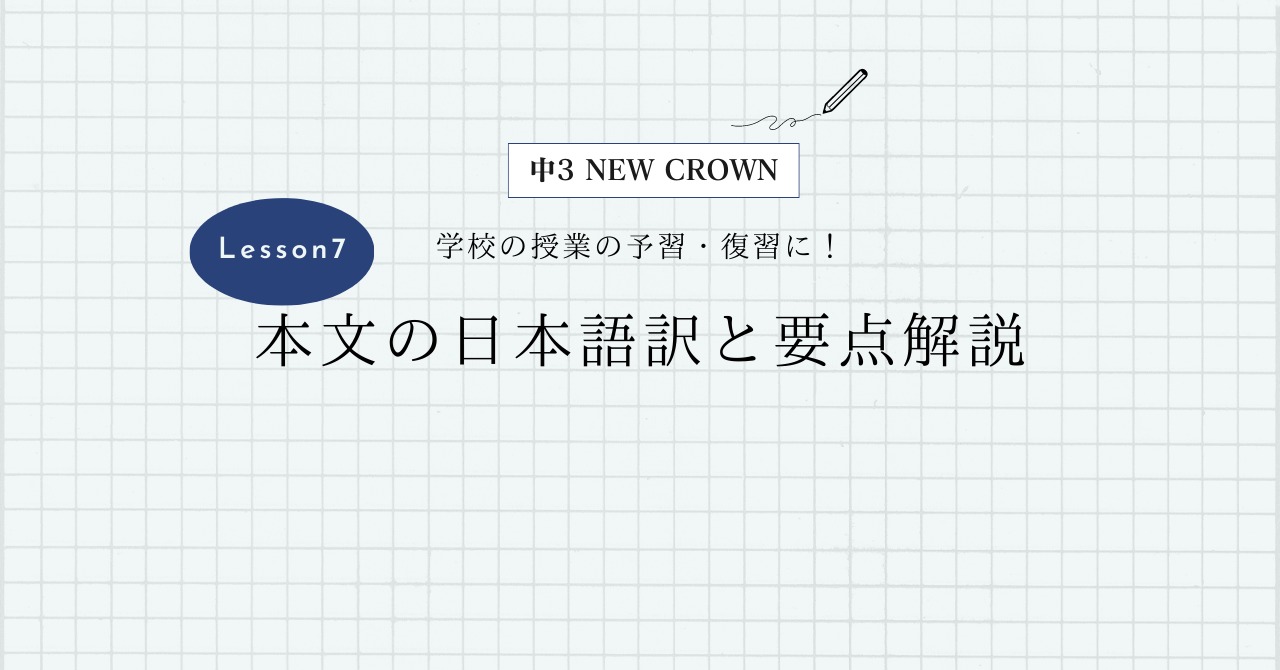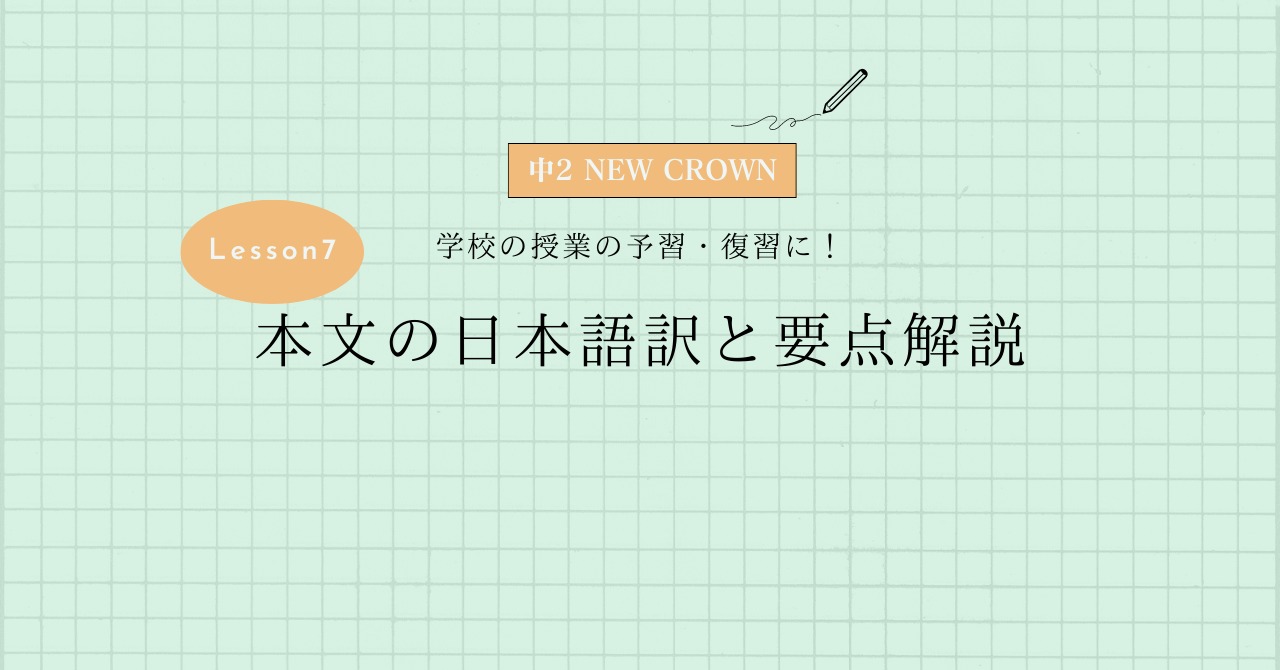三省堂 中学3年生 NEW CROWN(ニュークラウン) Lesson7 Part3の本文の日本語訳と重要箇所の解説です。
Lesson7-1,7-2の解説はこちらからご覧ください。
>中3NEW CROWN Lesson7 Part1 本文和訳
>中3NEW CROWN Lesson7 Part2 本文和訳
- Lesson7 Part3 本文と日本語訳
- Lesson7 Part3 重要事項の解説
- I work as a doctor in Japan.
- Every summer I work for four weeks in a non-governmental organization (NGO).
- I go to places that have serious health problems.
- I have been to many countries around the world.
- The NGO’s team members are from different countries, and we speak different languages.
- We use English to communicate within the team and with local doctors.
- Our team helps the local doctors learn medical treatments.
- They help us learn the patients’ needs.
- Sometimes we cannot understand each other well.
- I have learned that I need to explain things clearly and sensitively.
- Language is one of the necessary tools for communication and understanding.
- We must use it with care and attention.
- I am a computer scientist, and I belong to a research team in California.
- One thing about language is clear from my experience: when you need a language, you will learn it.
- I found science and math were more important and interesting.
- However, when I was a university student, I realized that I needed foreign language skills.
- Now, as an AI researcher, I refer to articles in Chinese and listen to reports in German.
- In addition, I write papers and give presentations in English.
- Now I realize that learning languages is important even for a scientist.
- I need good language skills to reach my goals.
- With clear goals in mind, you can learn English and other languages.
- I own a ryokan, a Japanese-style inn.
- When Wakaba City appeared in a popular anime, foreign tourists started coming.
- My inn was popular at first, but gradually fewer foreigners came.
- I used English to interview my foreign guests.
- Their responses helped me see the matter more clearly.
- My foreign guests made several suggestions.
- Some wanted a choice of dishes for dinner and breakfast.
- All these ideas were new to me.
- I made some changes, and they worked.
- My customers were more satisfied than before.
- Not only that, more foreign guests came than ever before.
- Language is a way to discover new ideas.
- A foreign language can broaden your mind.
- Lesson7 Part3 まとめ
Lesson7 Part3 本文と日本語訳
I work as a doctor in Japan.
「私は日本で医者として働いています。」
Every summer I work for four weeks in a non-governmental organization (NGO).
「毎年の夏,私は非政府組織(NGO)で4週間働きます。」
I go to places that have serious health problems.
「深刻な健康問題を抱えている場所に行きます。」
I have been to many countries around the world.
「世界中のたくさんの国に行ったことがあります。」
The NGO’s team members are from different countries, and we speak different languages.
「NGOのメンバーは様々な国の出身で,様々な言葉を話します。」
We use English to communicate within the team and with local doctors.
「私たちはチーム内と,地元の医者とコミュニケーションをとるために英語を使います。」
Our team helps the local doctors learn medical treatments.
「私たちのチームは地元の医者が治療法を学ぶのを手伝います。」
They help us learn the patients’ needs.
「彼らは私たちが患者の要望を学ぶのを手伝います。」
Sometimes we cannot understand each other well.
「時々,私たちはお互いに上手に理解し合うことができません。」
I have learned that I need to explain things clearly and sensitively.
「私は物事を明確に敏感に説明する必要があることを学んでいます。」
Language is one of the necessary tools for communication and understanding.
「言葉はコミュニケーションと理解において必須の手段の1つです。」
We must use it with care and attention.
「私たちは注意して言葉を使わなければなりません。」
I am a computer scientist, and I belong to a research team in California.
「私はコンピューター科学者で,カリフォルニアの研究チームに所属しています。」
We study artificial intelligence (AI).
「私たちは人工知能(AI)を研究しています。」
One thing about language is clear from my experience: when you need a language, you will learn it.
「言葉について1つのことが私の経験から明らかになっています。それは,言葉が必要になると,それを習得できるということです。」
I did not study English very hard in high school.
「私は高校で英語をあまり一生懸命勉強しませんでした。」
I found science and math were more important and interesting.
「私は科学と数学の方が重要で面白いと思っていました。」
However, when I was a university student, I realized that I needed foreign language skills.
「しかし,私が大学生の時,外国語の能力が必要だと気づきました。」
Now, as an AI researcher, I refer to articles in Chinese and listen to reports in German.
「今,AIの研究者として,中国語の論文を参照して,ドイツ語の報告を聞いています。」
In addition, I write papers and give presentations in English.
「さらに,英語で論文を書き,プレゼンテーションをしています。」
Now I realize that learning languages is important even for a scientist.
「今は,言葉を学ぶことは科学者でさえも重要なのだと実感しています。」
I need good language skills to reach my goals.
「私は目標を達成するために優れた言語のスキルが必要なのです。」
With clear goals in mind, you can learn English and other languages.
「頭の中に明確な目標があれば,英語と他の言語を習得することができます。」
I own a ryokan, a Japanese-style inn.
「私は日本式の宿屋である旅館を所有しています。」
When Wakaba City appeared in a popular anime, foreign tourists started coming.
「ワカバ町が人気のアニメに登場した時,外国の観光客が来始めました。」
I made English brochures for them.
「私は彼らのために英語の小冊子を作りました。」
My inn was popular at first, but gradually fewer foreigners came.
「私の宿屋は最初は人気でしたが,次第に外国人はあまり来なくなりました。」
I didn’t know why.
「私はなぜなのかわかりませんでした。」
I used English to interview my foreign guests.
「私は外国のお客にインタビューするために英語を使いました。」
Their responses helped me see the matter more clearly.
「彼らの反応によって,私は問題がよりはっきりと見えました。」
My foreign guests made several suggestions.
「外国のお客はいくつかの提案をしてくれました。」
Some wanted a choice of dishes for dinner and breakfast.
「夕食と朝食で出る料理の選択肢が欲しかったという人がいました。」
Some wanted a washing machine and free Wi-Fi.
「洗濯機とフリーWi-Fiが欲しかったという人もいました。」
All these ideas were new to me.
「これらすべてのアイディアが私にとっては新しいものでした。」
I made some changes, and they worked.
「私はいくつか変更を加え,それらは上手くいきました。」
My customers were more satisfied than before.
「お客は以前よりも満足していました。」
Not only that, more foreign guests came than ever before.
「それだけではなく,かつてないほど多くの外国のお客が来ました。」
Language is a way to discover new ideas.
「言語は新しいアイディアを発見するための手段です。」
A foreign language can broaden your mind.
「外国語はあなたの考え方を広げてくれます。」

Lesson7 Part3 重要事項の解説
I work as a doctor in Japan.
“as”は「~として」という重要な前置詞です。
Every summer I work for four weeks in a non-governmental organization (NGO).
“for 数字”で「~間」という表現ですね。
“governmental”は「政府の」という形容詞で,“organization”は「組織」という名詞になります。
“non-governmental organization”で「非政府組織」=「NGO」です。
I go to places that have serious health problems.
“place”は「場所」という名詞ですね。
“that”は「主格の関係代名詞」で,“that have serious health problems”が先行詞“places”を修飾しています。
“serious”は「深刻な」という形容詞で,“health”は「健康」,“problem”は「問題」という名詞になります。
I have been to many countries around the world.
この文では「現在完了の経験用法」が使われていますね。
“around the world”は「世界中」という表現です。
The NGO’s team members are from different countries, and we speak different languages.
名詞に‘sを付けると「~の」という所有を表します。
直前の名詞が複数形のときは” teachers‘ “のようにアポストロフィーだけを最後に付けます。
“be from~”は「~出身だ」という意味で,“come from~”と同じですね。
“different”は「様々な,異なった」という形容詞になります。
We use English to communicate within the team and with local doctors.
“to communicate”は「不定詞の副詞的用法」になっていますね。
“communicate”は「コミュニケーションをとる,意志疎通する」といった動詞です。
“within”は「~の中で,~以内で」という前置詞,“local”は「地元の」という形容詞になります。
Our team helps the local doctors learn medical treatments.
“help 人 動詞の原形”で「人が~するのを助ける,手伝う」という重要表現です。
“learn”は「を学ぶ,習得する」といった動詞になります。
“medical”は「医療の」という形容詞で,“treatment”は「治療」という名詞です。今回は合わせて「治療法」と訳しました。
They help us learn the patients’ needs.
ここでも“help 人 動詞の原形”が使われていますね。
“patient”は「患者」,“need”は「必要,要求」という名詞になります。
Sometimes we cannot understand each other well.
“sometimes”は「時々」という副詞ですね。
“understand”は「を理解する」という動詞で,“each other”は「お互い」という重要表現です。
“well”は「上手に,よく」という副詞になります。
I have learned that I need to explain things clearly and sensitively.
この文でも「現在完了」が使われていますね。また,「接続詞that」も使われています。
“need”は「を必要とする」という動詞で,“need to 動詞の原形”で「~することを必要とする」となります。「不定詞の名詞的用法」になっていますね。
“explain”は「を説明する」という動詞で,“thing”は「もの,こと」という名詞になります。
“clearly”は「明確に,はっきりと」,“sensitively”は「敏感に」という副詞です。
Language is one of the necessary tools for communication and understanding.
“one of 複数名詞”は「~の中の1つ」という意味です。
“necessary”は「必須の」という形容詞で,“tool”は「道具,手段」,“communication”は「コミュニケーション,意志疎通」,“understanding”は「理解」という名詞になります。
We must use it with care and attention.
“must”は「~しなければならない」という助動詞ですね。
“it”は“Language”を指しています。
“care”は「心配,世話,配慮」,“attention”は「注意」という名詞になります。
“with care and attention”で「注意して」という意味になりますよ。
I am a computer scientist, and I belong to a research team in California.
“belong to~”で「~に所属する」という意味になります。
“research”は「調査,研究」という名詞ですね。
One thing about language is clear from my experience: when you need a language, you will learn it.
“clear”は「明らかな,明確に」という形容詞になります。“experience”は「経験,体験」という名詞ですね。
最後の「:」は「コロン」と言い,簡単に言うと「つまり」という具合に直前の文章を補足します。コロンを使うときは,コロンの前は必ず文にしないといけない点に注意してください。
最後の文では「接続詞when」も使われています。
I found science and math were more important and interesting.
この文でも「接続詞that」が使われています。
“found”は“find(を見つける)”の過去形で,“that”と組合わせると「~と分かる」という意味になります。今回は「思った」と訳しました。
また,ここでは「比較級」も使われていますね。“important”は「重要な」,“interesting”は「面白い」という形容詞になります。
However, when I was a university student, I realized that I needed foreign language skills.
“however”は「しかし」という意味の副詞になります。
同じ意味で“but”がありますが,こちらは接続詞なので品詞が異なります。“but”は“文A,but 文B”というように,2つの文を繋ぐ際に使います。
“文A. But 文B.”というように,“but”を文の先頭に置いて1文だけで完結させるのは原則NGとなります。
また「接続詞when」も使われています。“university”は「大学」という名詞ですね。
“realize”は「と気づく,悟る」という動詞で,後ろには「接続詞that」が使われています。
“foreign”は「外国の」という形容詞で,“skill”は「スキル,能力,技術」といった名詞になります。
Now, as an AI researcher, I refer to articles in Chinese and listen to reports in German.
“refer to~”は「に言及する,を参照する」という表現ですね。
“article”は「記事,論文」,“report”は「報告」という名詞です。
In addition, I write papers and give presentations in English.
“in addition”は「さらに,加えて」という重要表現です。
“paper”は「紙,論文」という名詞で,“give a presentation”で「プレゼンテーションをする」という表現になります。
“in 言語”は「~語で」となります。
Now I realize that learning languages is important even for a scientist.
この文でも「接続詞that」が使われています。
“even”は「~でさえ,たとえ~であっても」といった強調を表す副詞になります。
I need good language skills to reach my goals.
“reach”は「達する,到着する」といった動詞で,“to reach”は「不定詞の副詞的用法」になっていますね。
“goal”は「目標」という名詞です。
With clear goals in mind, you can learn English and other languages.
“with”は前置詞で「~と一緒に」と訳すことが多いですが,必ずしも後ろに人が来るわけではありません。イメージとして「~とセットで」と覚えておきましょう。
訳し方としては「~を使って」「~で」など文脈に合わせて柔軟に変えてあげましょう。
“mind”は「頭,心,精神」といった名詞です。“other”は「他の」という形容詞になります。
I own a ryokan, a Japanese-style inn.
“own”は「を所有する」という動詞で,“inn”は「宿屋」という名詞ですね。
“Japanese-style”は「日本式の」という意味になります。
“a ryokan”と“a Japanese-style inn”は「同格語」になります。“名詞,名詞”の並びは「同格語」の可能性が高いですよ!
When Wakaba City appeared in a popular anime, foreign tourists started coming.
この文では「接続詞when」が使われています。
“appear”は「登場する,現れる」という動詞で,“popular”は「人気な」という形容詞になります。
“coming”は「動名詞」になっていますね。
My inn was popular at first, but gradually fewer foreigners came.
“at first”は「最初は」という重要表現になります。
“gradually”は「次第に」という副詞ですね。“foreigner”は「外国人」という名詞です。
“few”は後ろに数えられる名詞(可算名詞)を置いて,「ほとんど~ない」という否定的な意味になります。さらに今回は「比較級」にもなっていますね。
訳では「外国人はあまり来なくなりました」としました。
I used English to interview my foreign guests.
“interview”は「にインタビューする,面接する」という動詞で,“to interview”は「不定詞の副詞的用法」になっています。
“guest”は「客」ですね。
Their responses helped me see the matter more clearly.
ここでも“help 人 動詞の原形”が使われていますね。
“resopnse”は「反応」,“matter”は「問題」という名詞です。
最後は「比較級」にもなっていますね。
My foreign guests made several suggestions.
“several”は「いくつかの」という複数を表す形容詞です。
“suggestion”は「提案」という名詞ですね。
Some wanted a choice of dishes for dinner and breakfast.
“some”は「ある人達,一部の人」といった名詞になります。
“choice”は「選択(肢)」,“dish”は「料理,皿」という名詞ですね。
All these ideas were new to me.
“these”は“this”の複数形で,「これらは,これらの」といった意味になります。
I made some changes, and they worked.
“change”は「変更」という名詞で。“they”は“All these ideas”を指していますね。
“work”は「上手くいく」という意味もあり,今回はこの意味です。
My customers were more satisfied than before.
“customer”は「客」ですね。
“be satisfied with~”は「~に満足する」という重要表現です。
また,この文も「比較級」になっていますね。
Not only that, more foreign guests came than ever before.
“not only~”は「~だけでなく」という表現になります。“that”は直前の文全体を指していますね。
“more”は“many”の「比較級」で,“ever before”は「かつてないほど」といった“before”を強調した表現です。
Language is a way to discover new ideas.
“way”は「方法,手段,道」という名詞になります。
“discover”は「を発見する」という動詞で,“to discover”は「不定詞の形容詞的用法」になっています。
A foreign language can broaden your mind.
“broaden”は「を広げる」という動詞で,“mind”は名詞で「考え方」という意味もあります。
Lesson7 Part3 まとめ
以上がLesson7 Part3の日本語訳となります。
ここでは「helpの使い方」が重要です。しっかり理解していきましょう!
>中3NEW CROWN Lesson7 Part1 本文和訳
>中3NEW CROWN Lesson7 Part2 本文和訳
何か分からない点や他に解説してほしい点があれば,お気軽にコメントしてください!




コメント